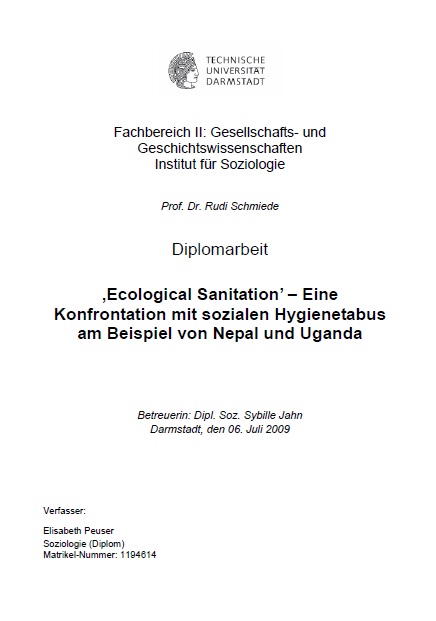Ecological Sanitation – Eine Konfrontation mit sozialen Hygienetabus am Beispiel von Nepal und Uganda (in German) - Ecological Sanitation - A confrontation with social hygiene taboos examples from Nepal and Uganda
Peuser, E. (2009)

Published in: 2009
Publisher:
Diploma Thesis, TU Darmstadt, Germany
Author:
Peuser, E.
Uploaded by:
SuSanA secretariat
Partner profile:
common upload
4728 Views
62 Downloads
Location of library entry
Content - Summary
The present thesis targets to be a contribution to estimate the social acceptance of ‘ecosan’ (= ecological sanitation) at the case of Nepal and Uganda. Is the new paradigm in sanitation accepted and practised in the selected developing countries? Are there any social or cultural taboos associated with the implementation and planning of ecosan? Does the existing hygienic and sanitation habits influence the acceptance of ecosan? These are relevant questions, which should be answered in this thesis.
Nepal and Uganda differ a lot concerning their geographical location, religion, culture andsocial values. To analyse if a successful implementation of ecosan and the social acceptance constitute each other and whether or not there is a difference between the opposed societies, these countries were compared.
Generally, due to the close contact with faeces, the aspect of reuse is the biggest challenge. Furthermore it should be mentioned that both countries lacking awareness and the absence of education provokes a
high refusal to ecosan. However, this could be reversed by trainings and workshops.
Summary in German:
Die vorliegende Diplomarbeit soll ein Beitrag zur Einschätzung der sozialen Akzeptanz von ‚ecosan’ (=ökologisch nachhaltige Sanitärversorgung) innerhalb der Länder Nepal und Uganda sein. Wird das neue Paradigma der Sanitärversorgung in den ausgewählten Entwicklungsländern gut aufgenommen und praktiziert? Stehen der Planung bzw. der Implementierung eventuell sozial oder kulturell bedingte Tabus entgegen? Wirkt die vorherrschende Hygieneeinstellung eher förderlich oder hemmend bezüglich einer Einführung von ecosan? All diese Fragen gilt es zu beantworten.
In beiden Ländern konnte innerhalb bisheriger Pilotprojekte insgesamt eine positive Einstellung gegenüber ecosan festgestellt werden, wobei sich dies je nach Region unterscheidet: in ländlichen Gebieten ist die Implementierung einfacher, da man einen primären Nutzen der Fäkalien in der Landwirtschaft hat. Nepal unterscheidet sich von Uganda hauptsächlich in Bezug auf das herrschende Kastensystem, welches den Umgang mit Fäkalien nur in niedrigen Kasten gestattet und somit in höheren Kasten zu einer gehemmten Einstellung gegenüber ecosan führt. Auch die Tatsache, dass in Nepal die Mehrheit der Bevölkerung dem Hinduismus angehören, welcher menschliche Ausscheidungen und den Umgang damit als ‚unrein’ betrachtet, stößt auf Probleme. In Uganda kann im Vergleich dazu ein verbreiteter Aberglaube/Voodoo (besonders in den nördlichen Gebieten Ugandas) identifiziert werden, der zu einer geringen Akzeptanz von ecosan führen kann.
Bibliographic information
Peuser, E. (2009). Ecological Sanitation – Eine Konfrontation mit sozialen Hygienetabus am Beispiel von Nepal und Uganda (in German) - Ecological Sanitation - A confrontation with social hygiene taboos examples from Nepal and Uganda. Diploma Thesis, TU Darmstadt, Germany
Filter tags
Case studies in other formats East Asia & Pacific German Sub-Saharan Africa















